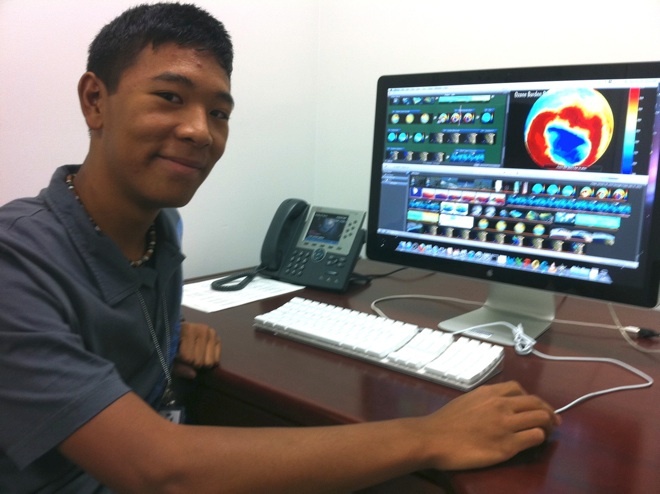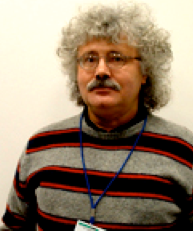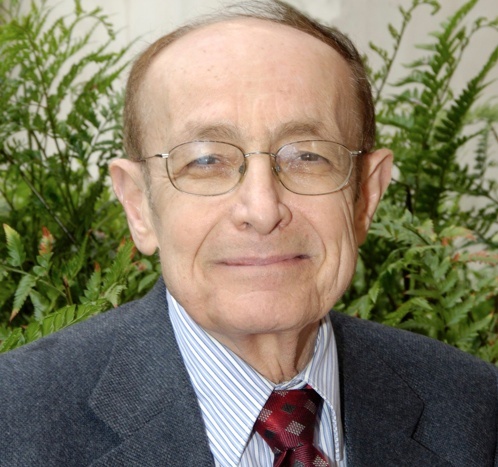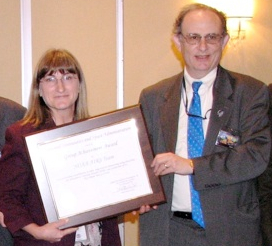News | July 22, 2011
High school student Jarrod Suda shares his experience as a summer intern for the Atmospheric Infrared Sounder Project

Jarrod Suda. Credit: Sharon Ray
By Sharon Ray, NASA Jet Propulsion Laboratory
While the lazy days of summer may be upon us, that's hardly been the case for incoming high school senior Jarrod Suda. Jarrod has been more than busy modeling temperature inversions, beta testing software for Earth satellite missions, and writing feature stories. As a summer intern for the Atmospheric Infrared Sounder Project at NASA's Jet Propulsion Laboratory in Pasadena, California, Jarrod answers a few questions and details what the intern experience has been like for him.
Why did you decide to pursue an internship at JPL?
I believe that in school passionate teachers tremendously influence their students' career choices. During high school my biology teacher guided me closely through the education process. After working closely under him, I acquired a love for the sciences and gained an interest in JPL. Although I had previous exposure to JPL, living locally, I never thought about working there until I got that solid background to rely on.
What have you worked on this summer?
As a summer hire for the AIRS project, I have written articles based on research on the Earth's atmosphere. This experience has not only taught me more about the intensive research done at JPL but it has also taught me how to communicate facts into meaningful application. During my experience, I was also introduced to computer programming, which was quite complex to say the least. It was intimidating for a beginner like myself, but I was able to understand the basics with the help of some very knowledgable mentors. In the end, I successfully visualized some data and it was very gratifying.
Who are some of the people you've met?
First off, the staff I worked with were incredibly kind and helpful. The receptionist Angela Smythe and I made friendly conversation on a daily basis by the coffee maker. The project manager, Tom Pagano, gave me insight into the working world and became a role model of professionalism for me. Steve Licata showed me step by step how to program data and how to analyze it scientifically. My devoted outreach mentor, Sharon Ray, gave me assignments to work on, took me to various meetings, and taught me how to navigate the world of networking. Lastly, I met with the resident JPL artist Dan Goods, who showed me some amazing artwork that he has displayed across different science centers.
Has the experience been valuable for you?
This experience was so valuable because it revealed to me what I loved about work and what I didn't like so much about work. I am now incredibly more prepared for the work force than I was at the start of the internship because I was mentored by so many people in so many subjects. Yes, I learned a tremendous amount about the Earth's atmosphere but more importantly, I learned about how to clearly visualize my career choices as well as pursue my passions. I learned that while working you also need to enjoy it because life is too short for the wrong job.
Any advice for future interns?
Working at JPL will definitely better your resume, but that by itself is not a reason to apply. If you display both curiosity and passion for science as a part of your character, then you will have a far more enjoyable experience. I have an unorthodox love for the arts, but I was still able to incorporate that into my intern experience by writing and visualizing data. Take initiative to incorporate your passions with your work by proposing new ideas and asking for help. As said by data visualizer Ed Olsen who assisted me in several computer projects, "There are no stupid questions."
AIRS Data Visualization from JZS on Vimeo.






